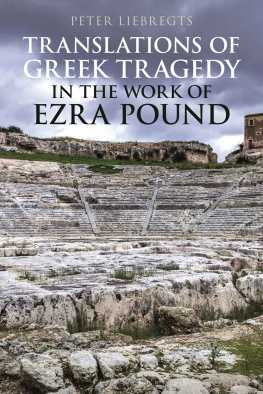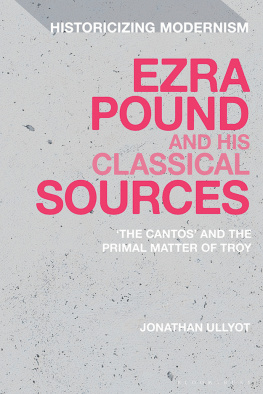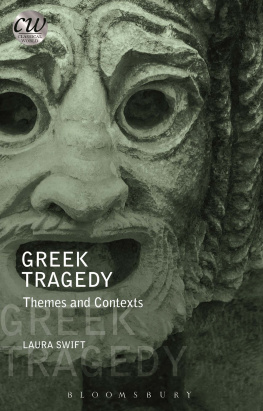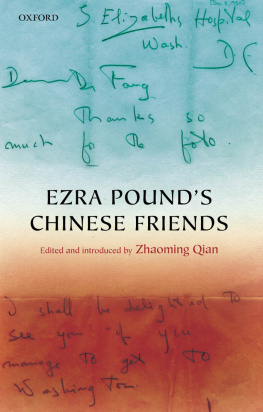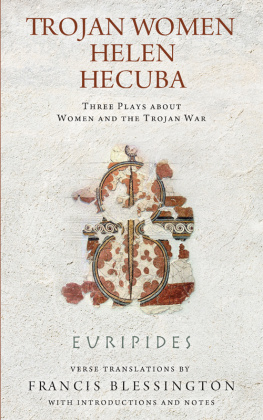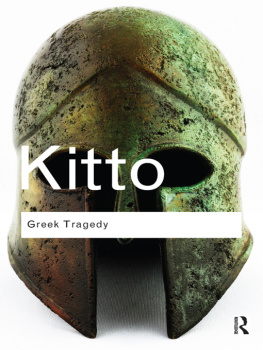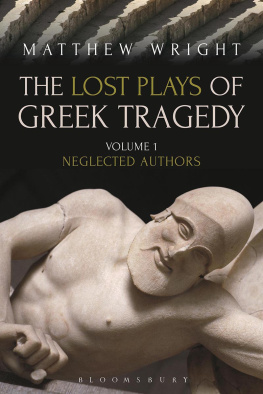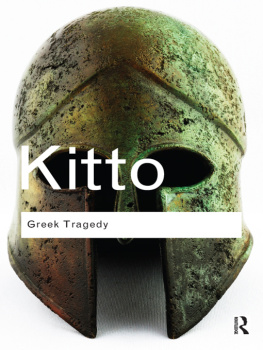
Translations of Greek Tragedy in the
Work of Ezra Pound
Bloomsbury Studies in Classical Reception
Bloomsbury Studies in Classical Reception presents scholarly monographs offering new and innovative research and debate to students and scholars in the reception of Classical Studies. Each volume will explore the appropriation, reconceptualization and recontextualization of various aspects of the Graeco-Roman world and its culture, looking at the impact of the ancient world on modernity. Research will also cover reception within antiquity, the theory and practice of translation, and reception theory.
Also available in the Series:
Ancient Magic and the Supernatural in the Modern Visual and Performing Arts, edited by Filippo Carl & Irene Berti
Ancient Greek Myth in World Fiction since 1989, edited by Justine McConnell & Edith Hall
Antipodean Antiquities, edited by Marguerite Johnson
Classics in Extremis, edited by Edmund Richardson
Frankenstein and its Classics, edited by Jesse Weiner, Benjamin Eldon Stevens & Brett M. Rogers
Greek and Roman Classics in the British Struggle for Social Reform, edited by Henry Stead & Edith Hall
Homers Iliad and the Trojan War: Dialogues on Tradition, Jan Haywood & Naose Mac Sweeney
Imagining Xerxes, Emma Bridges
Julius Caesars Self-Created Image and Its Dramatic Afterlife, Miryana Dimitrova
Once and Future Antiquities in Science Fiction and Fantasy, edited by Brett M. Rogers & Benjamin Eldon Stevens
Ovids Myth of Pygmalion on Screen, Paula James
Reading Poetry, Writing Genre, edited by Silvio Br & Emily Hauser
The Codex Fori Mussolini, Han Lamers and Bettina Reitz-Joosse
The Classics in Modernist Translation, edited by Miranda Hickman and Lynn Kozak
The Gentle, Jealous God, Simon Perris
Victorian Classical Burlesques, Laura Monrs-Gaspar
Victorian Epic Burlesques, Rachel Bryant Davies

Contents
The picture on the cover of this book is of the Greek theatre near Siracusa on Sicily, built in the fifth century BCE and renovated in the Roman period. In January 1925 Ezra Pound and William Butler Yeats visited the site, and in his essay Hell (1934) the American poet recalled that Yeats wanted him to speak some verse aloud to test out the acoustics. The Irish poet was annoyed when Pound bellowed Sapphos Greek ode to Aphrodite, but he explained his refusal to spout English poesy by claiming that English verse wasnt CUT. This anecdote is but one of many telling examples of Pounds admiration for what he regarded as the unsurpassed musical and rhythmic quality of classical Greek poetry, which throughout his life he would champion as a model to emulate in English.
This monograph aims to offer a detailed, at times line-by-line, from Greek to English philological analysis of Ezra Pounds translations of Greek tragedy, while contextualizing these versions with regard to the poets biography and his work, particularly The Cantos. The key texts are Pounds renderings of Aeschylus Agamemnon and Sophocles Elektra and Trachiniae. In the case of the last two plays, this book will show on the basis of my own cribs of the Greek and through comparison with English translations by F. Storr and by Richard Jebb, both used by Pound, how Pounds versions came about. This analysis will include material that has not as yet been published or has been understudied, particularly Pounds annotations to his Loeb edition of Sophocles (now in his personal library at Brunnenburg), his unpublished correspondence with scholars such as F. R. Earp and Rudd Fleming, as well as manuscript versions of the plays, and other as yet unpublished drafts and texts.
Chapter 1, Translation, Metrics, and Greek Tragedy, deals with the question of the extent of Ezra Pounds knowledge of classical Greek, his views on existing translations from the Greek, and what, in his perspective, a translation should be like. This chapter also discusses Pounds changing views on the relationship between poetry and the dramatic element in Greek tragedy, with a particular focus on his interest in melopoeia and Greek metrics in relation to English poetry. The first chapter thus contextualizes what will be one of the claims of this book, namely, that Pounds renderings are based on a careful reading of the Greek source texts, which will become clear in the detailed analyses presented in the subsequent chapters.
Chapter 2, Ezra Pound and Aeschylus, offers a detailed look at Pounds interest in the Greek playwright. It begins with a discussion of his two essays on Aeschylus published in The Egoist in early 1919, with a focus on what Pound considered the touchstones of the Agamemnon. Given his high praise for this play, the chapter offers a philological analysis of Pounds attempt at rendering the beginning of the Agamemnon, and concludes with a discussion of Pounds use of Aeschylus in The Cantos, showing how there is a continuous appropriation of his writings until the late 1950s, especially of the Oresteia.
Chapter 3, Ezra Pound and Sophocles, opens with an as yet unpublished text from the Beinecke library, which is not a translation but rather a spoof on Sophocles Oedipus Rex, which can be seen as a bridge between Pounds attempt at the Agamemnon and his later work on Sophocles. It then deals with the influence of the work of the classicist F. R. Earp, especially his book The Style of Sophocles (1944), followed by a discussion of Pounds collaboration with Rudd Fleming in translating Elektra. The chapter ends with possible reasons why Pound was so attracted to Elektra and Trachiniae, and not to the other Sophoclean plays.
In Chapter 4. Pound, Sophocles, and Elektra I, we will first take a look at scholarly approaches to Sophocles Elektra, with a particular focus on Jebbs edition and Earps book on Sophocles, as these were available to Pound, and on a contemporary discussion by H. Kitto in Greek Tragedy (1939), before taking a look at Pounds method of translating the play. The remainder of the chapter offers a detailed philological analysis of Pounds rendering of Sophocles Elektra ll. 1250.
This analysis is continued in Chapters 5 and 6, Pound, Sophocles, and Elektra II and Pound, Sophocles, and Elektra III, dealing with ll. 2511057 and ll. 10581510, respectively. Together these three chapters make clear how Pounds work on the play is related to the Pisan Cantos and his 1950s work on Confucius. By providing the original Greek with a transliteration followed by a crib, the reader can assess in detail the extent of the relation between Sophocles and Pounds, at times idiosyncratic, version. The analysis also discusses the musical interplay in Pounds version between the Greek and his rendering. Special attention is paid to the lyrical sections of the play. Furthermore, these chapters also take into account changes made from typescript to published version, Flemings comments and suggestions, and Pounds annotations in his Loeb edition. By offering this (on occasion line-by-line) analysis, the chapters provide an in-depth discussion of Pounds perspective on the play, and on the characters involved. Chapter 6 ends with a coda discussing Pounds use of Elektra in Canto 90.
Chapter 7,
Next page
